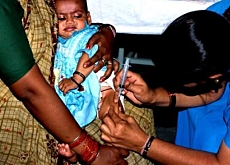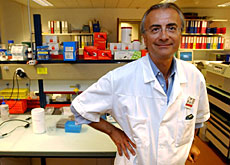Day of reckoning looms for global vaccine fund

A new international, multi-billion dollar scheme designed to boost investment in vaccines for poor countries is set to disburse its first funds.
But does this represent a breakthrough in combating killer diseases which claim millions of lives each year? swissinfo polled Swiss pharmaceutical firms and development organisations.
The idea seems so simple, it is a wonder no one thought of it before.
Take long-term, legally binding aid commitments from public/private donors and borrow against them by issuing bonds on the capital markets.
Funds raised are then distributed quickly to support aid projects – in this case immunisation programmes in developing countries – and save millions of lives.
This is how the International Finance Facility for Immunization (IFFIm), launched last autumn and expected to make its opening payment in the first quarter of this year, should work.
The British government-led initiative has pledges of more than $4 billion (SFr5.23 billion) over the next ten years from western nations and private donors such as the Bill and Melinda Gates Foundation.
Preventable diseases
The World Health Organization in Geneva estimates that more than two million children die each year from preventable diseases.
But up until now, efforts to immunise children against preventable diseases such as measles and hepatitis B have been hampered by a lack of “stable, predictable and coordinated cash flows”, according to Gavi (Global Alliance for Vaccines and Immunization), the Geneva-based organisation charged with overseeing IFFIm.
“Through innovative financing mechanisms such as the IFFIm, pharmaceutical companies and vaccine manufacturers are virtually guaranteed markets for their products,” Jean-Pierre Le Calvez of Gavi told swissinfo.
The Swiss vaccine manufacturer, Berna Biotech, agrees.
“In the medium term, the IFFIm will certainly help increase the usage of vaccines currently available for diseases such as hepatitis B and yellow fever,” Yves Leurquin of Berna told swissinfo.
Shortsighted?
But he warned that it would do little to encourage research into new drugs.
“Creating a new vaccine takes between eight and ten years, and the IFFIm has a ten-year horizon, so it’s a little short in my view to spur development of breakthrough projects such as a vaccine for HIV or tuberculosis,” said Leurquin.
According to Berna Biotech, another important reason for new interest in the vaccine market is the shortcomings of “curative care”, with antibiotics no longer as effective as they once were.
This may be one reason why Swiss pharmaceutical giant Novartis made a bid for the remainder of Chiron last year (still subject to shareholder and regulatory approval), the fifth-biggest vaccine maker worldwide.
Novartis spokesman Chris Lewis said the Chiron acquisition was part of the company’s overall strategy, which includes “development of promising new growth platforms such as vaccines”.
“We see a lot of potential in the vaccines market worldwide. Gavi provides manufacturers with incentives but the situation is not as clear-cut as it sounds,” said Lewis.
Sustainability
Non-governmental organisations such as the Swiss NGO, Berne Declaration, question the sustainability of schemes like the IFFIm.
Julien Reinhard, responsible for health issues at the NGO, told swissinfo that governments in developing countries would be saddled with the high cost of keeping immunisation programmes running once aid money stopped flowing.
“These governments may not have the means or resources, leading to disastrous results,” he said.
Berne Declaration works with the Indian NGO, Drug Action Forum – Karnataka, which has been critical of New Delhi’s commitment to immunising all children against hepatitis B.
“Such initiatives… often only help the vaccine manufacturers,” said Gopal Dabade, a doctor from the forum.
Dabade added that the money spent on hepatitis B, which he says is not a major public health problem in India, was nearly equal to the combined cost of six other vaccines for infants.
swissinfo, Dale Bechtel
The IFFIm was launched in September 2005.
It is designed to convert long-term financial commitments from donors into bonds sold on capital markets, to front-load funding for vaccines for poor countries.
The first disbursement is expected to be made during the first quarter of 2006.
The Geneva-based World Health Organization estimates that more than two million children die of preventable diseases each year, and more than half of those are under five. Measles is the leading killer.
A further two million children die of diseases for which vaccines will soon be available, including meningitis and pneumococcal disease.
According to the Gavi Alliance, new resources made available through the International Finance Facility for Immunization will be invested in the introduction of new and underused vaccines including combination vaccines for diphtheria, tetanus, whooping cough and hepatitis B.

In compliance with the JTI standards
More: SWI swissinfo.ch certified by the Journalism Trust Initiative











You can find an overview of ongoing debates with our journalists here . Please join us!
If you want to start a conversation about a topic raised in this article or want to report factual errors, email us at english@swissinfo.ch.